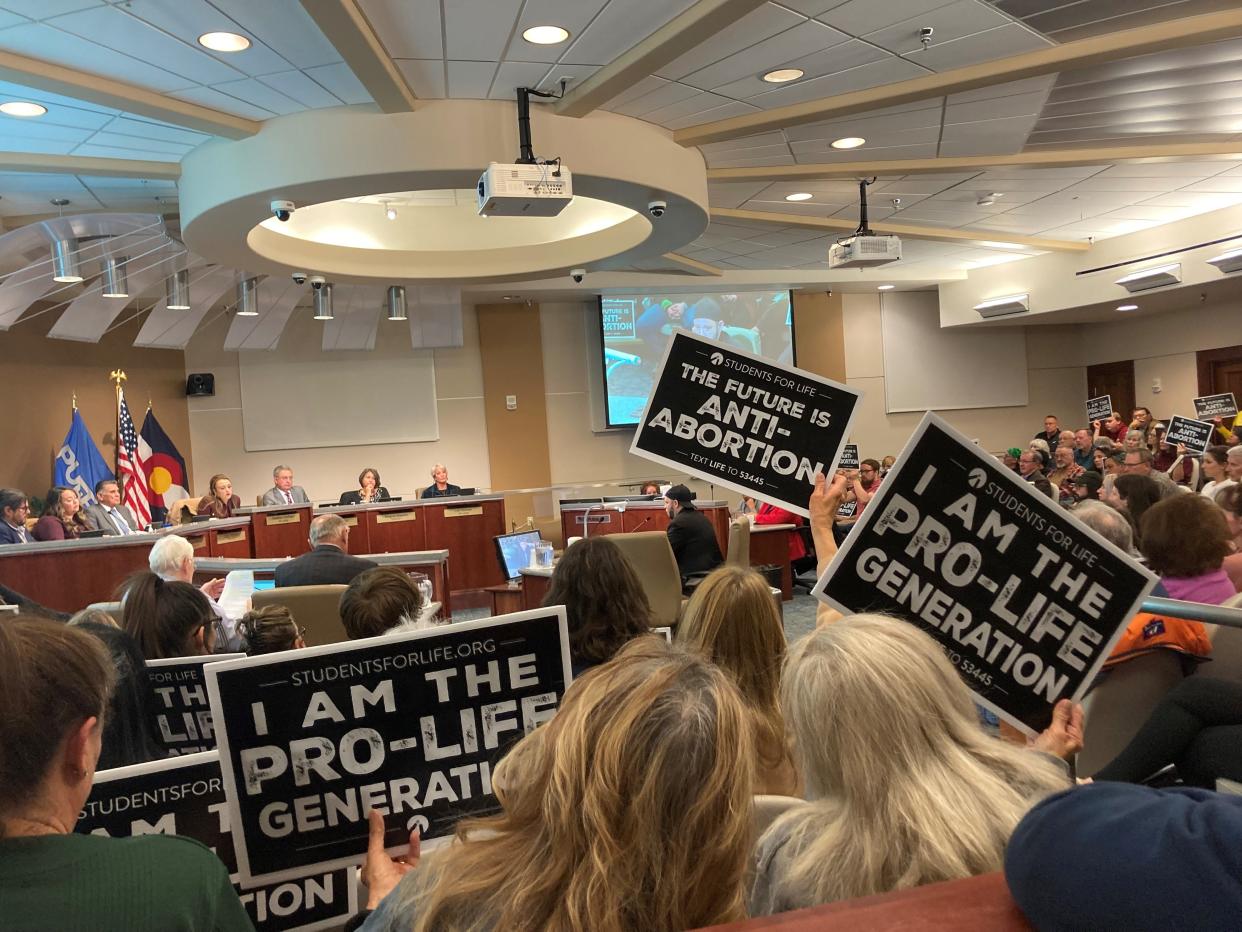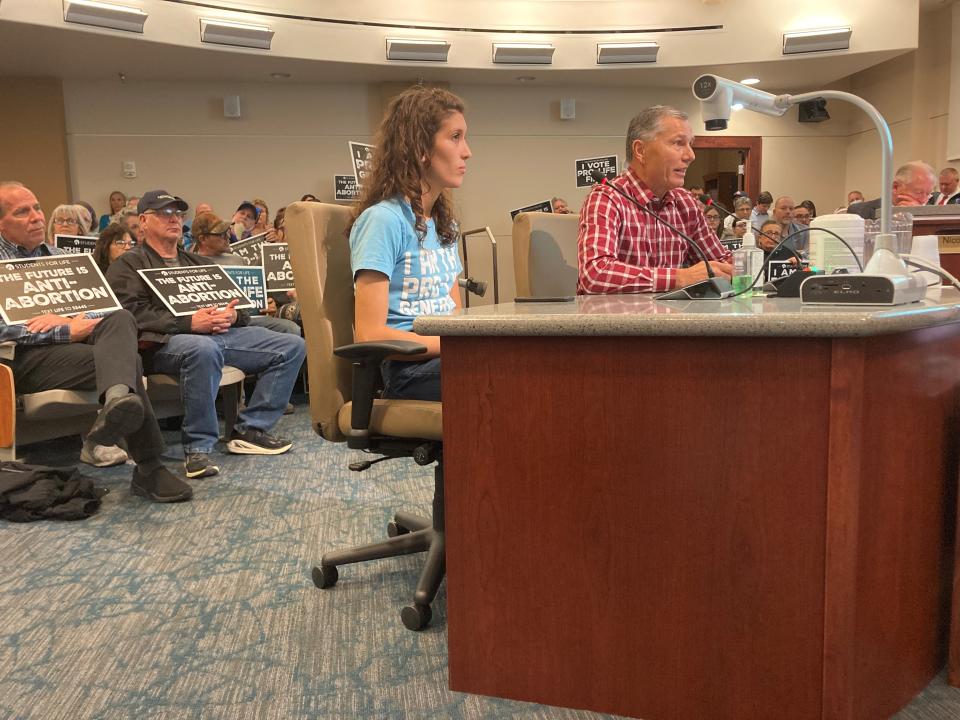Anti-abortion ordinance passes first reading at Pueblo City Council

The first reading of a proposed ordinance that could effectively ban abortions within Pueblo city limits was narrowly passed by Pueblo City Council on Monday.
Activists packed the council chambers — which reached its 135-person capacity 90 minutes before the regular meeting started Monday evening — the majority of whom oppose abortions, though some pro-choice activists also attended.
The proposed ordinance appears to be the first municipal anti-abortion regulation brought forward in Colorado. Its second reading at council is scheduled for Dec. 12.
Earlier this year, state lawmakers passed the Reproductive Health Equity Act to protect reproductive health care rights before the U.S. Supreme Court overturned the 50-year precedent of a Constitutional right to abortions and ruled that states can regulate the procedures.
Anti-abortion activist Mark Lee Dickson has been involved with passing dozens of municipal abortion bans for "sanctuary cities for the unborn" over the past few years, many in Texas, as well as the 2021 Texas “heartbeat” bill that banned most abortions after six weeks.
Dickson also helped draft the Pueblo ordinance and spoke during public comment Monday evening.
The proposed Pueblo ordinance uses the same mechanism of enforcement as the six-week abortion ban in Texas, where private citizens, instead of the government, can enforce the law by suing abortion providers.
The ordinance was sparked by the news of an abortion clinic planned in Pueblo. Clinics for Abortion and Reproductive Excellence, which also has locations in Nebraska and Maryland, has purchased a building in Pueblo’s Bessemer neighborhood but has not yet set an opening date.
Abortion clinic coming to Pueblo expects high volume of local and out-of-state patients
A representative with the clinic did not respond to the Chieftain's request for comment.
A Planned Parenthood branch in Pueblo, which did not provide abortion services, closed in 2015. The nearest abortion clinic to Pueblo is 50 miles north in Colorado Springs.
Colorado Attorney General Phil Weiser is “committed to defending the Reproductive Health Equity Act and challenging any local ordinance that violates the law,” said Lawrence Pacheco, the attorney general’s director of communications.
“Our office is monitoring developments regarding the proposed ordinance in Pueblo and has no further comment while it is under consideration by the Pueblo City Council,” Pacheco said.
City attorney Dan Kogovsek, who shared legal advice with city council in executive session before they discussed the ordinance publicly, declined to comment. The background paper for the proposed ordinance says that the city’s legal department does not recommend that council approves the ordinance.
Tenth Judicial District Attorney Jeff Chostner also declined to comment.

The Pueblo ordinance cites an 1873 federal law
The proposed ordinance stipulates that abortion providers in Pueblo must comply with federal law. One of the laws the drafted ordinance cites, an 1873 Comstock law, prohibits mailing abortion-related materials.
Portions of the Comstock laws banning contraception were overturned in the Supreme Court’s ruling of Griswold v. Connecticut in 1965, but it appears that the portions of the law regarding abortion materials are still on the books.
Dickson said that the proposed ordinance should be legal because federal law supersedes state law.
“We have no reason to believe this wouldn't work and we're not afraid of RHEA (the state reproductive health care law) because we know — we've seen Schoolhouse Rock — federal laws trump state statutes,” Dickson said.
Dickson added that nearly all of the still-operating abortion clinics in the U.S. are violating federal law and said that if a Republican president is elected in 2024, all of the clinics could be shut down.
Sara Neel, the senior staff attorney for the Colorado branch of the American Civil Liberties Union, said that the Comstock laws may not be applicable in this situation.
“The Comstock laws have been interpreted to only apply to unlawful items. Since abortion is lawful, and drugs have been approved by the FDA and even approved for mailing in the United States … I think their reliance on the Comstock laws is misplaced at the current time,” Neel said.
How Colorado’s new pro-choice law works
The Reproductive Health Equity Act (RHEA) stipulates that Colorado municipalities cannot infringe with access to reproductive health care and abortions “in the regulation or provision of benefits, services, information, or facilities.”
Democratic Rep. Daneya Esgar represented Pueblo at the state legislature for the past eight years and was one of the prime sponsors of the bill. Esgar told the Chieftain that she and her fellow lawmakers anticipated that local governments would attempt to curtail abortion access, but she didn’t expect this to happen in Pueblo.
“Pueblo voters have repeatedly said time and time again that they support a woman's right to abortion health care,” Esgar said.
Colorado voters have rejected five anti-abortion ballot questions since 2000 and Pueblo County has been in alignment with the statewide majority on all of the questions.
Councilwoman Regina Maestri, who introduced the Pueblo ordinance, claimed to the Chieftain that voters weren’t properly informed about abortion and that many voted the way they did because of the precedence of Roe v. Wade.
Dickson also said that voters have been misinformed and alleged that election fraud has happened in Colorado.
No credible evidence of widespread voter fraud has been proven in the U.S.

What city councilors said about the ordinance
City council customarily votes twice on proposed ordinances: the first reading of an ordinance is grouped into the meeting’s consent agenda, where items are lumped together and passed through a single council vote. At the following regular meeting, usually scheduled two weeks apart, council votes individually on each of the ordinances and hears a report from city staff.
The consent agenda usually passes council without contention, but councilor Vicente Martinez Ortega attempted to table the proposed ordinance on abortion regulation indefinitely.
Although municipal elected officials are nonpartisan, two of the other registered Democrats on council sided with Martinez Ortega. Councilor Larry Atencio voted with the three registered Republicans on council to pass the first reading of the ordinance.

Atencio said that he wants to hear more information in addition to what councilors discussed in executive session about the provider and federal laws.
City council went into executive session to receive legal advice from Kogovsek for approximately one hour before the regular meeting started. Council discussed projects and issues from Pueblo Economic Development Corp. as well as legal advice on municipal regulations of abortions.
“You want me to make a decision on this because you have a certain position on this. I don't have that. … What I need is information,” Atencio said, addressing the majority of the crowd in council chambers who were anti-abortion.
“I'm a religious person myself, but I don't want somebody to come in here and tell me, ‘God said this.’ Well, I'm sorry, he didn't say that. My religious teaching says that I respect everyone being for what they are. And I respect everyone for their opinion,” Atencio said, adding that the question about whether an abortion clinic should be allowed in Pueblo should go to voters.
Council President Heather Graham, who is the first challenger to announce a mayoral bid against incumbent Mayor Nick Gradisar in next year’s election, thanked everyone who came to council. Graham said she felt “very conflicted” on the issue and said that she needed more time and information, adding that people should continue contacting their councilmembers.
“I think this ordinance is really tricky. I don't know if I like exactly the way this one is written, but I am willing to listen and to hear people come and talk because I don't know that my mind's made up completely,” Graham said.
Graham mentioned that the public will be able to speak during the next meeting scheduled on Dec. 12. General public comment at the beginning of council meetings is limited to six speakers allotted five minutes each, but an unlimited amount of people can speak for and against ordinances when read on final presentation.
Martinez Ortega and councilwoman Sarah Martinez (no relation) also voted against the consent agenda.
“We've learned that abortion access is protected by the Reproductive Health Equity Act at the state level, which means that municipalities like ours legally cannot supersede the state legislation,” Martinez said Monday evening. “So, why are we spending time on this when we have so many other citywide concerns, like freezing temperatures and violent crime?”
Gradisar told the Chieftain Tuesday that if the ordinance passes, he has not yet considered whether he would exercise his veto power.
“I'm going to cross that bridge when we come to it. Let’s see if they have the votes to pass it,” Gradisar said.
At least five of seven councilors would need to override a mayoral veto, according to the city charter.
Council will discuss the proposed ordinance again during a work session on Dec. 12 at 5:30 p.m. and is slated to vote on the ordinance at the regular meeting scheduled at 7 p.m. Councilors could still move to postpone a final vote on Dec. 12.
Anna Lynn Winfrey covers politics for the Pueblo Chieftain. She can be reached at awinfrey@gannett.com or on Twitter, @annalynnfrey.
This article originally appeared on The Pueblo Chieftain: Anti-abortion ordinance passes first reading at Pueblo City Council

